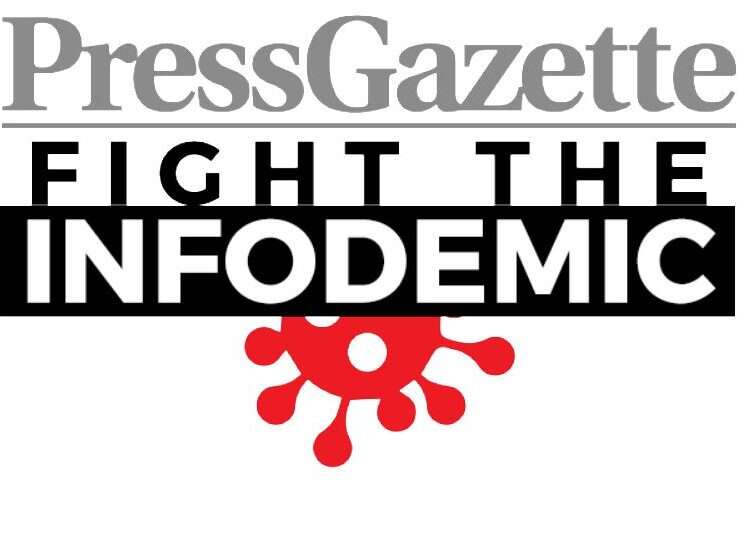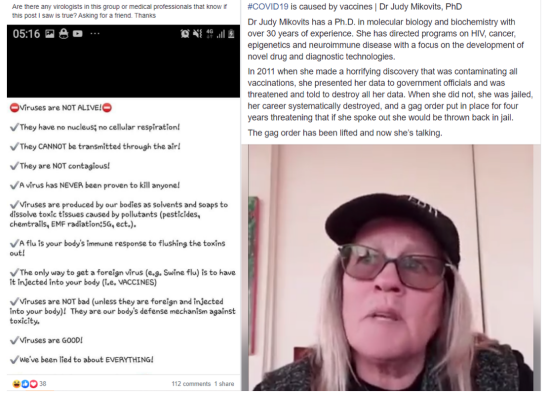
Social media giants are failing to tackle more than 90 per cent of Covid-19 misinformation posts, a new study out today suggests.
The research found that, despite making public pledges to crack down on dangerous falsehoods, Facebook, Instagram and Twitter have not acted to challenge content promoting unproven remedies for coronavirus and conspiracies about the disease’s origin.
The research comes after a poll of Press Gazette readers found that 79 per cent of more than 3,000 think social media companies are doing a “bad job” of combating the spread of fake news and conspiracy theories on Covid-19.
Press Gazette yesterday launched a new campaign, Fight The Infodemic, which calls on the tech platforms to take a more active role in promoting bona fide journalism and blocking misinformation.
Today’s research, published by campaign group the Center for Countering Digital Hate (CCDH) and charity Restless Development, was carried out by affiliated volunteer group Youth Against Misinformation. Volunteers for Youth Against Misinformation found and reported the posts between 20 April and 26 May.
For the research, they flagged up 649 posts to the three platforms – 334 on Facebook, 135 on Instagram and 179 on Twitter – which were deemed to be misinformation and in breach of the platforms’ stated standards.

Overall, they said 61 were acted upon by the platforms as of 1 June. Some 6.3 per cent of posts were removed, 2 per cent of posts were from accounts that were subsequently taken down, and 1 per cent were flagged as false information but remain online.
The CCDH said posts that were not acted upon included claims that viruses cannot be transmitted by air, that Covid-19 is caused by vaccines, that 5G mobile technology causes the disease, that Covid-19 is a hoax to cover up for 5G towers being erected, and that wearing a protective mask causes cancer. Some examples of posts that were not acted upon before 1 June are pictured below.

Screenshot taken on Instagram in April

Two screenshots taken on Facebook in April
CCDH chief executive Imran Ahmed accused social media giants of “shirking their responsibility to stop dangerous misinformation spreading” during the coronavirus crisis.
“Their systems for reporting misinformation and dealing with it are simply not fit for purpose,” he said.
“Social media giants have claimed many times that they are taking Covid-related misinformation seriously, but this new research shows that even when they are handed the posts promoting misinformation, they fail to take action.”
Ahmed added: “If social media giants continue to publish misinformation on their websites, then politicians need to hold them to account by imposing financial sanctions for the costs to the NHS, fire service, police and all of society that misinformation causes, and legislate for deeper, faster regulation.”
Rosanne Palmer-White, director of Restless Development UK, said: “We urge these companies to listen to young people who are their allies in finding dangerous misinformation, removing it swiftly and stopping it doing harm.”
A Twitter spokesperson said: “We’re prioritising the removal of COVID-19 content when it has a call to action that could potentially cause harm. As we’ve said previously, we will not take enforcement action on every tweet that contains incomplete or disputed information about Covid-19.
“Since introducing these new policies on March 18 and as we’ve doubled down on tech, our automated systems have challenged more than 4.3m accounts which were targeting discussions around Covid-19 with spammy or manipulative behaviours.
“Last month, we announced that we are introducing new labels and warning messages to provide additional context and information on some tweets containing disputed or misleading information related to Covid-19.”
Facebook did not respond to requests for comment. But the company told the BBC that the study’s sample was “not representative”.
A spokesperson for Facebook told the BBC: “We are taking aggressive steps to remove harmful misinformation from our platforms and have removed hundreds of thousands of these posts, including claims about false cures.
“During March and April we placed warning labels on around 90 million pieces of content related to Covid-19 and these labels stopped people viewing the original content 95% of the time.
“We will notify anyone who has liked, shared or commented on posts related to Covid-19 that we’ve since removed.”
The full report can be read here.
Email pged@pressgazette.co.uk to point out mistakes, provide story tips or send in a letter for publication on our "Letters Page" blog
